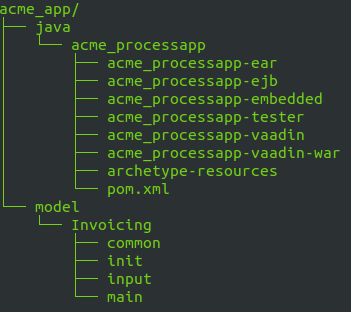
In the context of LSPS, the term log can refer to one of the following:
A log entry made when a model instances executes the Log task or log() function call.
Both, the task type and the function, are provided by the Standard Library and the entries are visible in the Logs view of the Management perspective and Management Console. These logs are stored in the LSPS_LOGS table of the LSPS system database.
A process log entry which is automatically created by model instances.
These are logs about execution progress. They are stored in the LSPS_PROCESS_LOG table and are not visible from any client. Further information is available in the Server Installation and Upgrade Guide
debugLog() function which is displayed in standard output.The JBoss or Wildfly server returns the following XA exception:
WARN [com.arjuna.ats.jta.logging.loggerI18N] [com.arjuna.ats.internal.jta.recovery.xarecovery1] Local XARecoveryModule.xaRecovery got XA exception javax.transaction.xa.XAException, XAException.XAER_RMERR
To remedy the situation, the database user has all required access rights:
For Oracle, make sure the Oracle user has access to the appropriate tables so they can accomplish the recovery:
GRANT SELECT ON sys.dba_pending_transactions TO user;
GRANT SELECT ON sys.pending_trans$ TO user;
GRANT SELECT ON sys.dba_2pc_pending TO user;
GRANT EXECUTE ON sys.dbms_xa TO user;
Substitute user with the user that connects from JBoss to Oracle. This solution works for Oracle 10g R2 (patched for bug 5945463) and 11g.
In an unpatched version older that 11g change the last GRANT EXECUTE to the following:
GRANT EXECUTE ON sys.dbms_system TO user;
Details, such as Model Instance details, in the Management perspective which are no longer valid might be open, for example, due to a database reset, and the data is no longer present in the database. Close any detail tab in the Management perspective.
If you get the following exception, fix the jdbc url of LSPS_DS in <YOUR_APP>-embedded/conf/conf/openejb.xml to JdbcUrl jdbc:h2:tcp://localhost/./h2/h2;MVCC=TRUE;LOCK_TIMEOUT=60000.
In your server logging configuration, activate the debug log level for com.whitestein.lsps.engine.CommunicationServiceBean and com.whitestein.lsps.engine.ProcessAgentImpl services and inspect the log.
Infinispan on JBoss and Wildfly returns the ISPN000299: Unable to acquire lock after 15 seconds: this occurs when an operation takes too long so the session is locked and fails to acknowledge the Vaadin heartbeat from the Application User Interface.
To remedy the problem, do the following:
<cache-container name="web" default-cache="passivation" module="org.wildfly.clustering.web.infinispan">
<local-cache name="passivation">
<!-- CHANGED the acquire-timeout here: -->
<locking isolation="REPEATABLE_READ" acquire-timeout="600000"/>
<transaction mode="BATCH"/>
<file-store passivation="true" purge="false"/>
</local-cache>
</cache-container>
<param-name>heartbeatInterval</param-name>
<param-value>300</param-value>
To prevent update of database schema when you upload a data-type model, you have the following options:
Clean cache of your browser.
Make sure your browser does not use out-of-date cookies and cached data: Clean the cookies and cached data.
Make sure your lspsVaadinApp servlet in the web.xml of the Application User Interface contains the closeIdleSessions parameter:
<!-- Vaadin servlet -->
<servlet>
<servlet-name>LspsVaadinApp</servlet-name>
...
<init-param>
<param-name>closeIdleSessions</param-name>
<param-value>true</param-value>
</init-param>
</servlet>
This prevents Vaadin from sending heartbeats to the server after the session-timeout period. The session timeout is set in minutes in web.xml.
This is caused by Eclipse issue 497705. To remedy the situation, create a new PDS launcher:
#!/bin/bash
export SWT_GTK3=0
./lsps-design_64
An executable Module can become a model instance, while a non-executable module is intended as a resource and cannot be instantiated: If you have a module where you define the data model only (like in the model in the MVC pattern), it is not intended for execution. Hence it does not require the execution flag.
Note that if you import an executable module to another executable module, and you instantiate the importing module (the parent), the imported executable module will be instantiated as part of the model instance.
Make sure that the variable is in a context the other variable can access. If working with local variables of the same context, make sure the variable is already initialized: variables are initialized in the order they are defined in (make sure, the variables are not sorted alphabetically when using the Outline view).
def File file := getResource(module -> "my-module", path -> "file.pdf");
//to access the content binary: file.content.toString("UTF-8")
getResource() function: new FileResource({ -> getResource("form_components", "output/myfile.txt")})
Check if you are not using a semi-colon (;) instead of a comma (,) as a separator of the collection items: the system returns the last expression as the collection content.
Typical case of a misplaced semi-colon
new CategoryDataSeries([
//semi-colon at the end of the following line causes that
//only the next line is returned as the content
//of the collection:
new CategoryDataSeriesItem("Pears", 1, 5);
new CategoryDataSeriesItem("Apples", 2, 6);
]);If you want to create a model instance over an entity, pass the shared Record to the createModelInstance() function:
createModelInstance(true, thisModel(), mySharedRecord := new MyRecord() , null);
You can then get the Record with a getProcessEntity(MyRecord) function call.
To get to-dos of a model instance, create a query with the model instance as its parameter that return the Todo type and define a condition that will exclude to-dos of other model instances, for example, todoIterator.modelInstanceId == modelInstanceParameter.id;
Use the findAll() function of the Standard Library to get all the shared records of a particular type. Also note you can use the countAll() function to get the number of the shared records.
properties parameter when creating the proxy instance with the proxy() call.preCreateWidget() method to create the proxies.Create indexes for foreign keys on the data relationship ends: select the relationship and in the Properties view, define the indexes on the Indexes tab. Alternatively, you can generate them automatically: in the Outline view, on the Tree tab,-click the root node Data Types and in its Properties view click the Generate Indexes button.
You can find information on how the schema was changed in the Module Management view of the Management Perspective: click the Schema Update Scripts tab.
Check whether the data type model meets the following:
This occurs due to an issue in Hibernate. To work around it, do one of the following:
If you are assigning a value to your variable in an InitListener, make sure the component with the InitListener is actually displayed. InitEvents are fired only on component display.
Make sure the Listener is defined by expression option on the Expression tab is not selected.
If you are using the None value in the Filter value provider, make sure the type of the column value provide on the Detail tab of the column defines its value (in the case of Identity, the value should be set to the type, such as String).
If a data series does not plot correctly, consider defining the values for all properties explicitly, for example, if you are changing the color of a decimal series, apart from the color parameter, set also the range to true and lineStyle to lineStyle.solid:
c.setPlotOptions(new PlotOptionsLineArea(color -> new Color(0, 0, 0), lineStyle -> LineStyle.solid, fillColor -> new Color(230, 200, 180),range -> true));
This happens on the root components of the Expression component: the modeling id of the root component returned by the expression in the Expression component uses the modeling id as set on the Expression Component in its properties. Calls to setModelingId() on the component that is the content of the Expression component are ignored.
A process that has parameters cannot run without its parameters; hence, it can be instantiated only by another entity which provides the parameters. To solve the situation, display the properties of the process and on the Detail tab unselect Instantiate Automatically.
A document is not part of a model instance and process instances can exist only as part of a model instance. Hence this is not possible. However, you can create a model instance with the createModelInstance() call.
Typically when setting access rights for to-dos and documents, you want to check if the user who is working with the application at the given moment has the required modeled role. Use the isPersonIn() function.
//Example setting of access rights:
isPersonIn( getCurrentPerson(), common::Client() )
Close and reopen the editor.
Validation reports an error of an undefined symbol for an expression that should result in in a Type: This happens if the type contains <>. To solve the problem, wrap the type in the type() function.
To format a Date object, call the formatDate() mathod with the date format as it parameter; the formatter uses the DateTimeFormat with the pattern and time zone.
Example call
now().formatDate("EEEEEEEEEE, MMM d", "Pacific/Auckland")
Though you can use the foreach construct, consider the collect() function of the Standard Library, especially if you create new collections in the cycle: the collect() function runs a closure on each item and returns a list with the outputs from the closures.
Example over List
//list with lists of values and names for the ListDataSeriesItem:
def List<List<Object>> itemList1 := [[1, "I am item 1 with value 1"], [3, "I am item 2 with value 3"], [1.3, "I am item 3 with value 1.3"] ];
def ListDataSeries ls1 :=
//Collect returns a list of ListDataSeriesItem; it is then passed to the ListDataSeries constructor:
new ListDataSeries (collect(itemList1, { i -> def ListDataSeriesItem li := new ListDataSeriesItem(i[0] as Decimal); li.name := i[1] as String; li}));
Example over Map
//map of values and names for the ListDataSeriesItem:
def Map<Decimal, String> mapsOfItems := [1 -> "I am item 1.", 3 -> "I am item 2.", 1.3 -> "I am item 3."];
//Creating a list of data series:
[
new ListDataSeries (collect (mapsOfItems,
{ k,v -> def ListDataSeriesItem li := new ListDataSeriesItem(k, v)}
)
)
]
If your MS SQL Server reports deadlocks, the problem might by cause by orphaned transaction: make sure to kill any hanging orphaned transactions that block database resources if such transactions are present.
Example of a select that returns orphan transactions
select request_owner_guid as [UoW ID] from sys.dm_tran_locks where request_session_id = -2
When running on MySQL 5.6 with multibyte encoding (UTF-8), check if your database uses Barracuda as file format: SHOW VARIABLES LIKE 'innodb_file_format' If it is not the case, set the global innodb_file_format=Barracuda;set global innodb_large_prefix=on;ROW_FORMAT DYNAMIC
If you are not using Barracuda, the initialization of the LSPS database will fail with the exception:
This occurs because MySQL uses the InnoDB engine which restricts the column length and LSPS requires wider columns than allowed by MySQL.
The recommended best practise is to structure your project as follows:
Example project structure

In the lsps-design_64.ini in $PDS_HOME, add the following before vmargs:
--launcher.GTK_version Alternatively, add set the SWT_GTK3 environment variable to 0:
export SWT_GTK3=0If a to-do or document returns an error similar to the following, reset the to-dos and delete the relevant documents from the database (currently no API for this action is provided).
Processing failed. The to-do is temporarily unavailable.